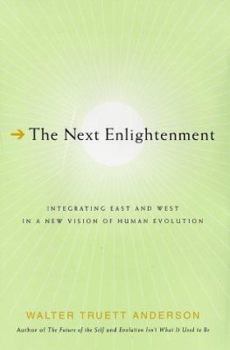The Next Enlightenment: Integrating East and West in a New Vision of Human Evolution
Select Format
Select Condition 
Book Overview
In The Next Enlightenment , Walter Truett Anderson treats Eastern spiritual traditions and Western philosophy, psychology and science as steps along the same evolutionary path rather than as... This description may be from another edition of this product.
Format:Hardcover
Language:English
ISBN:0312317697
ISBN13:9780312317690
Release Date:August 2003
Publisher:St. Martin's Press
Length:263 Pages
Weight:1.20 lbs.
Dimensions:1.0" x 6.4" x 9.6"
Customer Reviews
3 ratings
A mediocre book on an excellent subject
Published by Thriftbooks.com User , 18 years ago
Contrary to the review below, this is not a terrible book. I can see what Stacy means when she complains that Anderson selects from the scientific literature only that which supports his belief system, but just about every author writing on this subject does that as well. Anderson shows good intuition in choosing a subject -- cultural evolution -- that in my opinion represents the most important category for nonfiction books today. And while he may not be on the cutting edge of his subject, he is in the right area. The very fact that this book is out there adds to the weight of literature in this area. So while Anderson's thinking may be fairly mediocre, it is not as bad as the review below makes it seem. There were several good insights and a lot that confirms and restates what others have written on this most interesting subject.
A Valuable Guide
Published by Thriftbooks.com User , 20 years ago
I spent the better part of today reading this book, and I don't regret it. I find one of the other reader responses misleading because originality of ideas is not necessarily the most relevant criterium by which this book should be judged. Look, the strength of this book is that it is easy to read because it is direct and unpretentious and addresses the concerns and needs of those of us who have been struggling with expanding our consciousness.Whether Anderson has new information for us depends on how much we know and what the the nature of our personal experience is. Sometimes a book speaks to us precisely because we are familiar with the subject matter and we benefit from a different take which we experience as fresh, insightful - and, yes, reassuring when we are on a difficult personal journey. In that respect reading The New Englightenment has been a valuable experience for me. Wilber's books play a different role in my life.
KICKSTART YOUR SELF-EVOLUTION
Published by Thriftbooks.com User , 20 years ago
In his famous essay called "What is Enlightenment" philosopher Immanuel Kant says enlightenment is simply our ability to determine our own lives without leaning excessively upon authority, tradition or established values: in short, taking responsibility for our views as our views.Walter Truett Anderson takes up where Kant left off with an incredible book that urges a form of personal and cultural evolution he calls, "The Next Enlightenment," which reminds us that "ordinary maturity is not the ultimate stage of human development." "We usually are satisfied to think of maturity as growing up within a culture to fit a particular society's roles, rules and expectations," Anderson writes. But the kind of maturity encouraged in "The Next Enlightenment" is more a matter of growing up beyond culture. He cites "the Big Three" stumbling blocks to maturity as, "Cosmology, identity, and epistemology; how you think about the universe, who you think you are, and what you believe about belief."Anderson hopes "The Next Enlightenment" will show us that culture and all the values, beliefs and ideas it promotes is a "product of fallible beings ... only one of many ways to manage human interaction, and that its canon of universal truths is only one of many ways to describe the world." His book is a recipe for diversity and a primer on how to think outside the box; it provides a helpful and engaging introduction for those new to the minefield of cross-disciplinary thought and a wonderful review for those of us who read in this area daily.Because straightforward descriptions often fail to elucidate the inexplicable, writers of such texts are always on the lookout for good metaphors, and "The Next Enlightenment" is full of them. For example, Anderson writes that, "People become so involved in their identity-narratives that they become lost in them like some brilliant builder who constructs a wonderful maze of gardens and buildings and then cannot find his way out of them into the world beyond - who indeed forgets that there is a world beyond."Finally, Anderson manages to convey complex ideas with wit and humor in abundance. For example, he cites the story of the Buddha's tooth to show how we simultaneously idolize and misunderstand our great teachers. After the Buddha's cremation in 480 B.C. some of his followers sifted through the ashes and found two teeth - "apparently the only ones Buddha had left in an age innocent of floss and fluoride" - both of which currently serve as sacred relics, one at the Temple of the Tooth in Sri Lanka and the other at the Tooth Relic Pagoda on the outskirts of Beijing. But ironically the teeth are only sacred to those Buddhists who misunderstand or forget the Buddha's main teaching, "That everything is illusory and transient, and attachment to anything is the ultimate foolishness." And we might add, "Especially teeth!"That every time, place and people has its own version of the Buddha's tooth - and that culture wars and "the battle f





